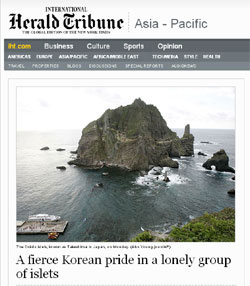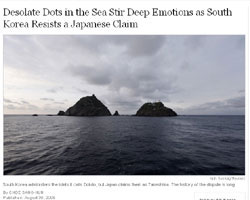
Dokdo article of International Herald Tribune
For such a small island, Dokdo has evoked much hard feelings and discomfort between Korea and Japan for over a century.
Once seen as a silly dispute over “a few pieces of rock,” from overseas perspectives, these days even the world's press is taking a peek into the rocky site that Korea is so fiercely defending.
In a recent trip by foreign correspondents to Dokdo sponsored by the Korean government, much emphasis was given to local sentiment toward the island that goes beyond mere questions of territory or resources.
“It is hard to overstate the emotional impact the dispute over the tiny islets – which if placed in New York's Central Park would occupy just 0.5 percent of its total area – has for South Koreans,” wrote Kim Hyung-jin in an Aug. 27 AP article entitled “S. Korean emotions run high over island dispute.”
The article describes the painful past of Japan's annexation of Korea from 1910 to 1945 and gives quotes from policemen, Dokdo residents and a professor, who all express bitter sentiments toward Japan.
“I explode with anger whenever they say it's their territory,” Kim Sung-do, 68 the resident of Dokdo was quoted as saying.
The piece goes on to explain that for Japan, however, “the dispute appears not to arouse anywhere near the same level of public emotion as in South Korea” except as a “favorite cause of the vocal right wing and among fishermen on Japan's western coast who want greater access to the rich waters between Japan and the Korean Peninsula.”
The article introduced the island as “South Korea-Controlled Dokdo.”
A more intense article was posted in the Aug. 28 edition of the
International Herald Tribune, “A fierce Korean pride in a lonely group of islets” by Choe Sang-hoon.
The article begins with a description of Dokdo as a not-so-attractive place with unpredictable waves and a lack of conveniences, including a public toilet. Choe stressed, however, that over the past three years Dokdo has emerged as a “highly popular pilgrimage for Koreans” frequented by 80,000 people alone this year.
The article goes on to explain the historical entanglement between Korea and Japan since the latter's colonial rule over the former from 1910 to 1945 and its takeover of the island five years earlier. Even after Korea's liberation, the article writes, “the postwar peace treaty between a defeated Japan and Allied powers did not resolve sovereignty over the islets.”
“When Japan claims Dokdo as its own territory, we Koreans feel as outraged as if someone pointed at our wife and claimed that she is his own,” the article wrote quoted Cho Whan-bok, secretary general of the Northeast Asian History Foundation in Korea, as saying.
Koreans' latest round of angry demonstrations meanwhile was triggered by Japan's Shimane prefecture that designated a special day for the island in 2005 to strengthen its claim.

Dokdo article of New York Times article
“Our national pride is at stake,” the article writes, quoting Kwak Young-hwan, captain of one of the Korean Coast Guard ships. “If we run out of firepower, we will ram our ship against the intruders!”
Another example of Korean fervor about the island surrounds the U.S. Board on Geographic Names, which recently changed the island's status from “South Korean” to “undesignated sovereignty,” until President Bush intervened before heading to Seoul for a summit, and the change reverted back to its earlier status.
Brad Glosserman, executive director of the private Pacific Forum CSIS in Honolulu, says of Dokdo: “South Koreans have taken it to their heart.”
“While for Japan this may be just one of several territorial disputes with its neighbors, notably China and Russia, for many South Koreans Japan's refusal to surrender title is tantamount to denying South Korea complete independence,” the article states.
“I will fight them, even if the only weapons I have are my bare fists,” Kim Sung-do was again quoted as saying at the end of the article. Kim is one half of the only couple resident on the island, whose house displays seven Korean national flags.
The same article can also be found in the Aug. 30 edition of the
New York Times, under the title "Desolate Dots in the Sea Stir Deep Emotions as South Korea Resists a Japanese Claim," which is a slightly abridged version. Nevertheless, it called the island Dokdo, Korea, and excluded the Japanese version of the name.
Reuters for its part reported on the Korean coast guards keeping an even closer eye on Dokdo in Marie-France Han's article “S. Korea steps up defense of disputed islets”. It said, “South Korea has responded by forming [a] research institute, sending ships to fortify Dokdo's defenses and saying it would build even mores structures on the islands it controls.”
“When I look at Dokdo I am filled with pride at the idea that I am working for the country,” said Kim Yang-soo, the police officer in charge of the 30-odd men stationed on the island.
Further explaining Korea's efforts to gain even more “scientific and incontrovertible proof that Dokdo is Korean,” the article added that the island stands as a “strong symbol” in Korea, in the words of a Korean named Lee.
By Kim Hee-sung
Korea.net Staff Writer